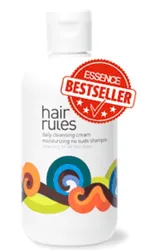
Hair And Beauty Product Splashback From FTC Disclosure Rules
Introduction - Hair And Beauty Product Splashback From FTC Disclosure RulesTurn the clock back three years to 2009. The hair and beauty blogging world was abuzz with the review the FTC guidelines which went into effect on December 1, 2009.
Details of the FTC Endorsement Guides can be found at: review the FTC guidelines.
Basic Premise Of 2009 FTC Guides
The basic premise behind the 2009 FTC Guides was that any product endorsements by bloggers or other "word-of-mouth" marketers had to clearly specify if the product was provided free of charge for the purpose of the review.
The FTC Guides, which were last updated in 1980, also covered hair and beauty product endorsements made by consumers, experts, organizations and celebrities.
The definition of “disclosure” by the FTC is very specific. It’s not enough to make a general disclosure. The discloser must be contained in the post itself. “So long as the disclosure clearly and conspicuously conveys to the reader the relationship between the blogger and the advertiser, the disclosure will be adequate,” states the FTC.
That means bloggers can note something as simple as, “Company XYZ provided this product to review” and you've done your FTC duty.
Of course this notification has to carry to Twitter, Facebook and other Social Media channels.
Compensation Is Defined As The Following
According to the FTC, compensation happens when you:
1. Receive a free product and review it
2. Link to the product’s website and receive a commission (called an affiliate program)3. Receive money, product or services in kind for posting about a product or products
4. Review a product or service which comes from an advertiser on your site.The FTC does not require you to disclose a paid advertiser relationship if you:
Use a coupon for a more expensive brand of a company’s product from what you would normally buy, and blog about the product
Review products from a gift or related swag bag at a conference.FTC Guides - In A Nutshell
In a nutshell, the FTC can fine both a blogger and a hair and/or beauty company the blogger is writing a review or post about, if they do not disclose an arrangement where the company compensates the blogger for a review, positive mention, or sponsored post.
When the 2009 FTC guide revisions were released many in the hair and beauty blogging world were dismayed that they were suddenly held to a different set of product review standards.
Whereas traditional newspapers and publications did not have to specifically disclose whether products they recommended were provided at no charge, bloggers were now required to do so.
Back in 2009 many felt the hair and beauty product splashback from FTC disclosure rules would be significant. A common concern was that manufacturers of popular or newly introduced hair and beauty products would no longer offer their products for free in exchange for published reviews.
Questions - What Is The Hair And Beauty Product Splashback From FTC Disclosure Rules?
Now that three years have almost passed, what is the hair and beauty product splashback from FTC disclosure rules?
Listed below are some questions regarding the impact of the FTC rules:
1. Do bloggers and other "word-of-mouth" marketers boldly note the receipt of free products before their product reviews?
2. Have bloggers and related web writers basically ignored the FTC disclosure rules and continued on, business as usual?3. Do hair and beauty manufacturers continue to offer free products and services in exchange for published reviews?
4. What other impact has the FTC disclosure rules had on the hair and beauty blogging world?5. Do bloggers understand they are required to note paid relationships on Twitter and other Social Media channels?
6. Are bloggers and other Web content providers specifically noting their relationship with affiliate programs like Amazon and similar?Many people believe the FTC disclosure guidelines are ultimately a good thing since it protects the consumer by providing clear transparency for buying decisions.
Tweeting, Social Media And The FTC Guidelines
Tweeting and all related social media channels also fall under the FTC's guidelines. It's not enough to disclose a paid relationship just on your blog post.
If you tweet about your blog post, or you tweet about a product for which you have been compensated, experts suggest you add hashtags such as #paid, #paidad, #paid ad, #ad or #sponsored, #spon or similar at the end or similar.
Books Recommendations Or Related Links
This disclosure rule affects anyone who posts reviews with links about books on Amazon.When you post about a book and include a link to Amazon, the relationship has to be disclosed. The FTC But on the other hand, it’s best to just be transparent about it.
FTC Actions
In 2009 when the FTC issued the disclosure rules bloggers were concerned whether the FTC would take action if the rules were ignored. In fact, the FTC does take action on their 2009 ruling.
In one well-known case Anne Taylor was cited for providing gift cards to bloggers who didn't disclose the fact they were compensated. Of course Anne Taylor did not require the bloggers to do so, which was at the root of the FTC action. Legacy Learning received a $250,000 fine for an affiliate program they created for bloggers which was not properly disclosed.
While the FTC is not actively monitoring blogs and not announced plans to do so, it will investigate if complaints are made about possible violations.
FTC Considerations
Consider the following in order to comply with the FTC requirements:
1. Don’t write about any products, including books, if you haven’t personally tried it or have specific knowledge about the product.
2. If you were paid to try a product and you thought it was horrible, you can’t say it was fantastic. Either say nothing at all or be truthful about your experiences with the product.3. You can't make absolute claims about any product which can't be substantiated in some manner.
4. When in doubt, review the FTC guidelines.Summary - Hair And Beauty Product Splashback From FTC Disclosure Rules
Even if you carefully follow all the FTC Disclosure Rules by posting your paid relationship on your blog or other social media channels, there are other issues to be aware of.
The FTC can also slap your hand and/or trigger fines if it is determined that your post contains any misleading or unsubstantiated representations.Social Media Network Information
Please follow us on Twitter at: https://Twitter.com/HairBoutique. I look forward to meeting new people from all walks of Twitter and learning from their Tweets.





















